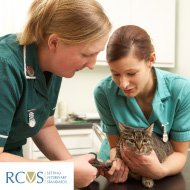
Decision follows government advice on social distancing
The RCVS Veterinary Nurses (VN) Council has agreed to temporarily suspend certain requirements for student VNs and training programmes.
The College said in a press release that the decision had been reached owing to the ongoing COVID-19 coronavirus pandemic and the UK government's advice on social distancing.
“We have been in discussion with veterinary nursing education providers regarding a number of concerns they have raised regarding the support for student veterinary nurses and the progression with their licence to practise qualifications,” explained Julie Dugmore, RCVS director of veterinary nursing.
“These include concerns that, under the current circumstances, student veterinary nurses would not be able to fulfil their clinical placement requirements, as well as not being able to undertake the required assessments. Furthermore, institutions offering veterinary nurse education would not be able to continue their programme of approving and quality monitoring Training Practices.”
She continued: “Therefore the following temporary arrangements and guidance have been approved by both the Veterinary Nurses (VN) Education Committee and VN Council. We ask that all student veterinary nurses, veterinary nursing education centres and Training Practices read the guidance.”
The temporary arrangements and guidance are as follows:
Clinical placements
1. Several universities have expressed concerns regarding student veterinary nurses’ attendance in clinical placement over the coming weeks, due to the precautions around transmission of Coronavirus. This applies, in the main, to full-time students in all years of a programme, although there are particular concerns as to the impact this will have on final-year students being unable to complete the required number of hours in order to complete their programme and graduate.
2. There have also been concerns raised over the completion of the RCVS Day One Skills for Veterinary Nurses (DOS) should students be unable to attend their clinical placements. RCVS Day One Competences and Day One Skills for Veterinary Nurses set out the minimum essential requirements that we expect all student nurses to have met when they register, to ensure they are safe and competent to practise on day one, in whichever area of the profession they start to work.
3. Universities and awarding organisations have requested a degree of flexibility around the RCVS VN Registration Rules and completion of the RCVS Day One Skills, in light of the COVID-19 situation. The following therefore applies:
a. We recognise that it should not be compulsory for students to complete clinical placements within the next eight weeks, after which the situation will be reviewed. This will apply to students in any year of their studies.
b. We recognise that for students in their final year of study, it may be difficult for them to make up the hours of clinical placement missed prior to graduation. Universities and colleges should continue to support students and explore alternatives, however any shortfall relative to the requirements should not be a barrier to completion of the programme.
c. For BSc students in years 1 to 3 of their studies and FdSc students in years 1 and 2 of their studies, we would expect that there will be sufficient time for them to make up the number of hours prior to completing the programme. However we will review this as the COVID-19 pandemic progresses.
d. Student veterinary nurses will still be required to complete the Day One Skills for Veterinary Nurses in their totality as these seek to assure competency at the point of registration. Where a student has completed the Day One Skills in less than the 1,800 hours, this will be assessed on a case by case basis on application to register.
4. We should be grateful if this information can be shared by universities, awarding organisations and colleges to provide reassurance for students.
Assessments
5. We note that accreditation standards require veterinary nursing programmes to include an OSCE or similarly robust, objective and evidence-based form of practical examination to test safe and effective acquisition of a broad range of skills and competences as outlined in the RCVS Day One Competences and Skills for Veterinary Nurses.
6. There has been some concern regarding the number of examiners required for OSCE assessments in light of announcements from some organisations that are not allowing staff members to attend large gatherings.
7. Universities and awarding organisations may need to explore alternatives to the current delivery of the unseen and Objective Structured Clinical Examination (OSCE) used for assessment of the RCVS Day One Competences and Skills for Veterinary Nurses, as a result of measures to protect students and staff and reduce the risk of Coronavirus transmission. In this respect, the RCVS Examinations Manager and Chair of VN Education Committee will review proposals for changes to the assessment.
8. As universities and awarding organisation explore alternative methods, they should continue to consider the robustness of their processes in assessing practical skills.
9. Universities and awarding organisations will still be required to assure us, through subsequent analysis and evaluation, that all their assessments were sufficiently met Day One Competences and Skills.
Training Practice Approval and Quality Monitoring activities
10. We recognise that remote approval and quality monitoring activities will reduce the risk of Coronavirus transmission to college staff, training practice staff, students and the public. Utilisation of desk-based activities and video-conferencing technology should be considered during this unique time. Where remote training practice approval has taken place, we would expect a follow-up visit in person once the coronavirus outbreak is under control, in line with the prevailing government advice.



 The Animal and Plant Health Agency (APHA) has updated its online reporting service for dead wild birds.
The Animal and Plant Health Agency (APHA) has updated its online reporting service for dead wild birds.